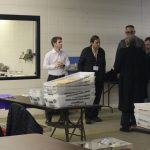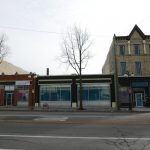Rufus Wainwright at the Pabst – August 26, 2007
It’s always a little surprising that rock bands look and sound as good as they do at the Pabst, a gilded German theater full of red velvet, Italian marble, and busts of famous Austro-Hungarians (Beethoven, Wagner). But it never fails – dirty, dance-y, pounding shows are exalted by the baroquerie of the opera hall, not diminished by it.
What a venue like the Pabst does for a performer like Rufus Wainwright, though, is something else entirely, something remarkable. For nearly ten years, the troubador has been crafting exquisite chamber-pop informed by opera, cabaret, lyricism, late-Victioriana, early modernism – melding every manner of anachronistic influence into something metropolitan, contemporary and very intelligent.
We had gallery seats – eye-to-eye with the 2-ton Austrian crystal chandelier – but there is intimacy, maybe even privacy, in the vertigo of the second balcony. From way up high, with glasses of wine (actually, I had a glass of wine; my date had a PBR), we enjoyed the sonorous, humble sounds of opening act A Fine Frenzy, a pleasant piano/drum/synth trio that did not in any way overstay their opening act welcome. Not so for The Magic Numbers, a jumpy, bass-heavy band from England that started out fun and stayed on to the point of anxious tedium.
He is every inch a star, and probably always has been. His demeanor is classical, his presence hypnotizing. He played brassy, jangly songs with his acoustic guitar and wrought, rich songs on the grand piano: one from his new album, “Going to a Town,” aches with a weary refrain: “I’m so tired of you, America”. The concert was being taped, so some of the songs – notably “Art Teacher,” another sad little aria about a schoolgirl who falls in love on a field trip to a museum – had to be performed twice, which was no cause for complaint.
It was almost like a salon, a parlor soiree – another welcome effect of the Pabst’s relative smallness – and Mr. Wainwright was the charming host, endearing us to him with fluttery banter and an uncanny command of the mood, from goofy (performing “Between My Legs” perched atop his boyfriend’s shoulders with a handful of giggly front-row fans dancing around him) to gorgeous (channeling Judy Garland in a lone spotlight) and exuding a certain tenderness for the audience (wearing liederhosen after his first set — this is, after all, German Athens). I felt like an honored guest, even up in the nosebleed seats.
I left before the end of the concert, more than two hours into his performance. It was getting late, the dim lights were making me drowsy, and besides, the slower, moodier set was shooting arrows so dangerously close to my heart that I wept more than once.
It sounds sentimental, but it’s true. Rufus Wainwright is (or one day will be) one of those timelessly gifted, endearing, and unerringly affecting musicians that we will all talk about having encountered when we are old and misty.













